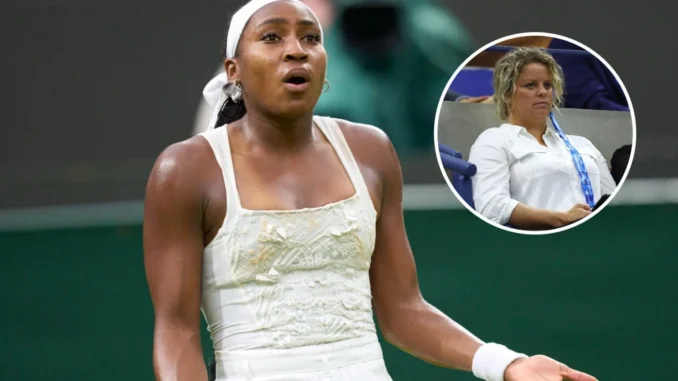
The hallowed grass courts of Wimbledon have long been a proving ground for tennis’s brightest stars, but for Coco Gauff, the 2025 Championships delivered an unexpected early exit that sparked widespread discussion. At just 21 years old, Gauff, a prodigy with a Grand Slam title already to her name, suffered a shocking first-round defeat, leaving fans and analysts searching for answers. Four-time Grand Slam champion Kim Clijsters, known for her keen insight into the game, pointed to a critical error in Gauff’s preparation, one that may have set the stage for her disappointing performance. “I was actually surprised,” Clijsters remarked, reflecting on Gauff’s choices leading up to the tournament.
Gauff’s loss came as a jolt to the tennis world, especially given her reputation as a mature and composed competitor. Facing a formidable opponent in Dayana Yastremska, Gauff struggled to find her rhythm, ultimately falling in straight sets. Yastremska, to her credit, delivered a stellar performance, showcasing precision and poise that overwhelmed the young American. The pressure was undoubtedly on Gauff, who entered Wimbledon as a seeded player and a fan favorite, but the match exposed vulnerabilities that Clijsters believes could have been mitigated with better preparation.
Clijsters, who was courtside watching Novak Djokovic dominate Alexandre Muller, shared her thoughts on Gauff’s defeat during a candid discussion on BBC Sounds. She pinpointed a key misstep: Gauff’s decision to return to the United States after the French Open rather than staying in Europe to acclimate to grass courts. “The one thing on Coco’s end that she can do a bit differently from yesterday,” Clijsters noted, “is that after the French Open, I was there for a few days and I flew back to the States to where my family is, and I saw Coco.” For Clijsters, this choice was puzzling. Grass, with its low bounces and slick surface, demands specialized practice, and Gauff’s transatlantic trip may have disrupted her ability to adapt.
The transition from clay to grass is notoriously challenging, even for seasoned professionals. Wimbledon’s courts require players to adjust their footwork, timing, and strategy, often within a tight window between tournaments. Gauff, still early in her career, has shown remarkable versatility, but Clijsters suggested that prioritizing grass-court practice could have made a difference. “She didn’t make the smartest decision heading into Wimbledon,” Clijsters said, emphasizing the importance of staying in Europe to train on grass or similar surfaces. This critique, while pointed, comes from a place of admiration for Gauff’s potential and a belief that small adjustments could yield significant results.
Despite the setback, Gauff’s youth and resilience offer hope for a quick rebound. At 21, she has already demonstrated maturity beyond her years, both on and off the court. Her ability to handle high-pressure situations, coupled with her powerful groundstrokes and athleticism, has made her a standout in the sport. Yet, as Clijsters noted, Gauff is still in the “very early stages” of her career, with room to grow and learn from experiences like this one. The Wimbledon loss, while stinging, could serve as a valuable lesson in the importance of preparation and adaptability.
Yastremska’s role in the upset cannot be overlooked. The Ukrainian played with confidence and aggression, capitalizing on Gauff’s off-day to secure a statement victory. Her performance underscored the depth of talent in women’s tennis, where any player can rise to the occasion on a given day. For Gauff, the defeat highlighted the fine margins that separate victory from defeat at the highest level. Factors beyond preparation, such as mental fatigue or the sheer brilliance of her opponent, likely contributed to the outcome.
As Gauff reflects on her Wimbledon campaign, the tennis world remains optimistic about her future. Her previous successes, including a U.S. Open title, prove her ability to compete at the elite level. The first-round exit, while a setback, is unlikely to define her career. Instead, it may serve as a catalyst for growth, prompting her to refine her approach to major tournaments. Clijsters’ advice offers a roadmap: prioritize surface-specific preparation and embrace the grind of adapting to new challenges.
The 2025 Wimbledon Championships have already delivered drama and surprises, and Gauff’s early exit is a reminder of the sport’s unpredictability. For fans, it’s a chance to witness a young star navigating the highs and lows of professional tennis. For Gauff, it’s an opportunity to regroup, reassess, and return stronger. As she prepares for the next challenge, the tennis world will be watching, eager to see how she responds to this moment of adversity.
Leave a Reply